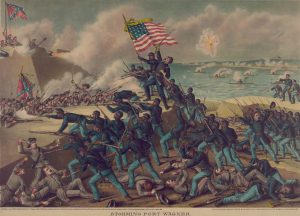There have been two apocalyptic events in history that have shaped my intellectual and emotional outlook on life. They are:
1. The systematic annihilation of European Jews between 1941-1945 at the hands of Nazi Germany2. The two hundred and fifty year enslavement of Africans in America between 1619- 1865
How did each end? In the spilt blood of apocalyptic war.
America finally came to complete grips with its own sin of slavery by engaging in civil war. No nation has ever gone to war with itself to overthrow an immoral practice.
America also created the circumstances in leadership, manufacture, and blood that defeated Germany thus ending the torture and destruction of European Jews during World War II.
What does that say about America? Eventually America gets around to doing the right thing, no matter the cost.
It’s hard to understand America. Why would we practice evil by bringing Africans to America in chains and treating them as non- persons for so long? And then, how were we able to raise up leaders who were willing to finally bring it to an end?
Also, before and during World War II most Americans were anti-Semitic. Yet, how were we able to eventually see clearly enough to turn history on its ear, and become the instrument of salvation for Jews worldwide?
In my opinion, what gives profound meaning to the American experience is that the nation was born from the beginning, and in large measure, on the ideas of the seventeenth century Enlightenment. If in the end those ideas did not emerge in some kind of miraculous way, America would not have had a legitimate reason to exist. Even at that, America has come close to blocking those ideas, and letting racism, power, fundamentalism, and nationalism run its full course as it has in almost every other nation in the world.
What are those ideas?
Every person, no matter who they are, where they live, or what culture they come from, is equal under the law; and no power, secular or religious, is greater than the civil liberties granted to each and every person irrespective of age, gender, creed, color, or sexual orientation.
What are those civil liberties?
Each person is inherently guaranteed maximum freedom to live out their full natural potential in this life; and each person is to be treated fairly under a set of rules that forever strive to enhance and protect the individual’s right to happiness, and to protect the individual against the tyranny of power.
Who best articulated these Enlightenment ideas?
It was political philosopher John Locke who saw them most clearly. Born in the seventeenth century, it was Locke who fired the imaginations of eighteenth century Americans like Thomas Jefferson to take hold and create a new nation based on the assumption that all men are created equal, endowed by “their creator” with inherent rights to life, liberty, and happiness.
It was Locke who gave birth to the idea of the “self”. In other words, government exists solely for the purpose of meeting the inherent needs of each individual. No one comes into this world pre-determined, but is a “tabula rasa” (“empty mind”) ready to be taught, nurtured, and shaped by their experiences with the laws of nature.
Government does not exist to perpetuate itself, or any group, or religion; it exists solely to enhance the life of each person.
Government does not exist to uphold any particular theory of culture, bloodline, privilege or ideology. It exists to protect and deliver each individual from injustice and danger.
The individual does not exist to serve the interests of the government or the agents of the government. It is first and foremost the other way round.
Nowhere in history is the individual self-given more life to live than in the writings of Locke, who is often called the architect of classical liberalism.
Does America live up to these Enlightenment ideas as articulated in the Declaration of Independence and the Constitution of the United States of America? No. Most of the time it is a disappointment. It interprets many situations in the traditional concepts of power and domination over the weak. It does this at both local as well as international levels.
But its enduring quality is that it does finally show up, and at times moves as nobly as any nation ever has. The apocalyptic wars mentioned earlier give testament to that, even though those two milestones happened far too late for far too many individuals.
(War, by the very nature of its primary activity to kill people, is evil. But, evil does not necessarily follow evil, especially when one’s core values are profoundly deeper than the evil of war one must manage through.)
That does not mean that leading up to moments of great decision, citizens do not act narrowly. They do. For example America’s lifelong obsession with states’ rights has caused no end of pain and suffering to blacks, Indians, gays, women, artists, intellectuals, atheists, etc. But, over time, these grievances seem to get addressed. Eventually, local power blocks of self-interest are broken, and replaced ever so gradually with the American idea that each and every person on the face of the earth is free and equal under the law, and should be given the opportunity to advance as a fully self-actualized human being.
References
Two Treatises of Government, Wikipedia
